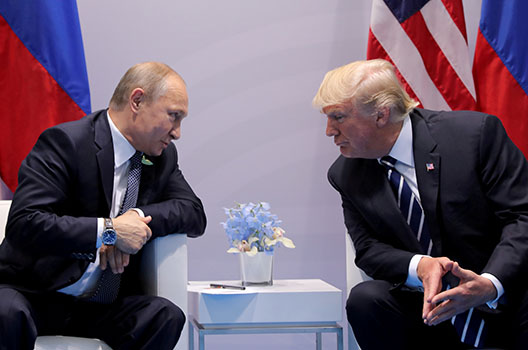 The US-Russia summit on July 16, which will take place several days after President Trump issues a broadside against NATO Allies July 11-12 for their lack of burden sharing, will undermine US and NATO interests vis-à-vis Russia. Although a summit between the US and Russian Presidents can be productive at the right time and with the right approach, particularly with tension running so high in US-Russian relations, now is not that time. President Trump should be focused on ensuring the visit of an American president to the continent, at a great time of insecurity and uncertainty in Europe, is done in a way that strengthens Allied deterrence, defense, and unity. A snap meeting with Russia’s president with little coordination with European allies runs cross purposes to that objective.
The US-Russia summit on July 16, which will take place several days after President Trump issues a broadside against NATO Allies July 11-12 for their lack of burden sharing, will undermine US and NATO interests vis-à-vis Russia. Although a summit between the US and Russian Presidents can be productive at the right time and with the right approach, particularly with tension running so high in US-Russian relations, now is not that time. President Trump should be focused on ensuring the visit of an American president to the continent, at a great time of insecurity and uncertainty in Europe, is done in a way that strengthens Allied deterrence, defense, and unity. A snap meeting with Russia’s president with little coordination with European allies runs cross purposes to that objective.
The driving force of the summit is President Trump, who has consistently sought to achieve a bilateral, high-profile summit with President Putin since taking office. Despite the advice of many of his own advisors, who counselled the president that a US-Russia Summit coming on the heels of a NATO Summit would be counter-productive and potentially destabilizing, President Trump brushed aside critiques and dispatched his national security advisor to Moscow to quickly put in place an agenda that will support a high-profile meeting intended to showcase President Trump as a leader able to conduct “big deals” with major players.
With no coherent US policy on Russia in place, either established internally within the administration or described publicly by administration officials, it begs the question: how can the United States define success for a summit? President Trump’s unwillingness to criticize President Putin, while feeling increasingly emboldened to attack NATO Allies like Chancellor Merkel directly over a range of defense and trade issues, ensures we can expect the optics of a US President shaking hands and smiling with President Putin will contrast greatly with the combative images that are likely to come out of the NATO Summit days prior.
One of the potential costs of the US-Russia summit may be that President Trump could seek to water down the range of deterrence measures that have been prepared for leaders to support at the NATO Summit, concerned that these strong measures may spoil his upcoming summit with President Putin. On the positive side, President Trump can seek to ensure Russia does not play a spoiler role in North Korea and undermines the administration’s interests in maintaining sanctions, while the two sides also will likely reinvigorate mechanisms like the NATO-Russia Council and deconfliction mechanisms in Syria that could dampen tension between US and Russian militaries.
Despite likely agreement between President Trump and President Putin to cooperate on Ukraine, Syria, and North Korea, President Trump will come home from Helsinki with real obstacles to improving US-Russian ties. Fundamental differences remain over Syria, Ukraine, and – most importantly – Russia’s interference in the US democratic process. Congressional skepticism of President Trump’s approach to Russia and continued congressionally mandated sanctions, along with the ongoing Mueller investigation of his campaign’s ties to Russia, will ultimately hinder any bold initiatives agreed to between President Trump and Putin at the summit. That said, the negative optics of a meeting and its negative impact on transatlantic ties, already frayed by a president interested in attacking, rather than working with NATO Allies, may be the biggest cost of a US-Russia summit this summer.
Mark Simakovsky is a nonresident senior fellow in the Atlantic Council’s Dinu Patriciu Eurasia Center and served as the Russia country director and Europe/NATO chief of staff in the Office of the Secretary of Defense for Policy.
Image: FILE PHOTO: Russia's President Vladimir Putin talks to U.S. President Donald Trump during their bilateral meeting at the G20 summit in Hamburg, Germany, July 7, 2017 (REUTERS/Carlos Barria)
